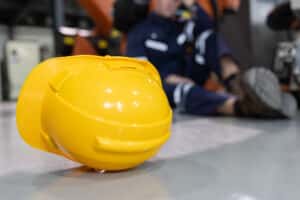In Washington state, workers’ compensation claims fall into two categories: industrial injury claims and occupational disease claims. Some factors, such as eligibility requirements and filing processes, may differ. It is important to know which type of workers’ compensation claim you need, as filing the wrong type could result in delays in your claim or even the rejection of your claims application.
Industrial Work Injury Vs. Occupational Disease
The main difference between an industrial injury and an occupational disease is the nature of the injury or illness.
Industrial disease claims or occupational injuries, by definition, pertain to an injury or illness incurred while on duty or at work, such as an accident caused by machinery, a slip or fall, or a burn injury. Injuries covered by industrial injury claims are usually visible and are easy to diagnose by a medical professional.
On the other hand, occupational disease is an illness or condition that develops over time caused by workplace conditions or environment. A good example is if a worker develops lung disease due to exposure to chemicals or dust in the workplace. Illnesses covered by occupational disease claims are usually more difficult to diagnose, as symptoms may take years to present and might not be immediately evident.
Another difference between industrial injury and industrial disease claims is the proof needed to establish a claim. An industrial injury claim requires you to prove the injury resulted from a work-related event. At the same time, an occupational disease claim requires you to show proof that a substance or condition at work caused the illness.
Statute Of Limitations (SOL) Differences
The Statute of Limitations also differs for industrial injury and occupational or industrial disease claims.
A worker who wishes to file a compensation claim must do so within one year of injury, as there is a one-year statute of limitations for industrial injury claims. Occupational disease claims have a longer statute of limitations of two years from when the worker is diagnosed with the illness. The statute of limitations for both can also begin on the date the worker knew the injury or condition was work-related.
Repetitive Trauma
Repetitive trauma is an injury incurred over time due to repeated actions in the workplace, such as rotator cuff injuries caused by lifting heavy objects. In Washington state, repetitive trauma is often considered an occupational or industrial disease claim, as it is a condition that develops over time.
Post-Mortem Claims
If, unfortunately, a worker passes away, the worker’s surviving family, such as spouse, children, or dependents, is entitled to file a post-mortem claim for workers’ compensation benefits. The claim should be filed within one year of the worker’s death. The family filing should also provide proof that a work-related injury or illness caused the death.
It is important to know the type of claim you will be filing, as failing to file your claim within the Statute of Limitations can result in losing the right to claim benefits.
Workers’ Compensation Attorney For Occupational Disease
The Department of Labor and Industries, or L&I, handles occupational disease claims in Washington state. When a worker files for compensation and benefits, L&I assesses the claim and determines if it is work-related and eligible.
L&I Assessment Of Occupational Disease
When filing an occupational disease claim with L&I, you must file it within the statutes of limitations and provide proof that your illness or condition is work-related. L&I may require an independent medical examination (IME) or additional evidence to support your claim.
Occupational or Industrial Disease Claim
Filing an occupational disease claim can be complicated. However, some lawyers specialize in occupational disease claims. A workers’ compensation attorney for an occupational disease could represent you if you developed an illness due to your working condition. An attorney specializing in occupational disease knows all the requirements and procedures, and hiring one can help ease the process of your occupational disease claim.
Recommendations For Where To Start
The statute of limitations for filing an occupational disease claim begins upon a diagnosis of the illness. If you have been diagnosed with an illness and you believe it was caused by the conditions in your workplace, you may be eligible to file for an occupational disease claim.
Criteria For An Occupational Disease Claim
After being diagnosed by your doctor, you should inform your employer immediately. Your company may have an internal process for handling workplace-related illnesses. Provide your employer with your doctor’s diagnosis and proof that you developed the illness due to your work.
As part of the requirements for filing an occupational disease claim, L&I may require you to provide proof of employment in addition to having a physician’s opinion on your condition. Refer to this document for other L&I occupational disease criteria.
Hazardous Chemicals And MSDS Laws
It is not the employer’s responsibility to file your occupational disease claim. However, your employer is responsible for providing a safe working environment compliant with the Hazardous Chemicals and Material Data Sheets laws. These laws protect workers from exposure to hazardous substances by ensuring employers provide the necessary equipment and procedures for a safe working environment.
Regarding filing with L&I, in Washington state, it is the worker’s responsibility to file the claim. Remember to provide medical evidence that your illness is work-related and file your claim within the statute of limitations. Also, be aware that L&I has different criteria to qualify for an occupational disease claim:
- The illness should have been caused by exposure to workplace hazards.
- The illness should have been incurred during the course of the workers’ employment.
- The illness should have been aggravated by the working conditions.
- The amount of time the worker was exposed to the hazardous conditions or environment should be enough to cause the illness.
Commonly Asked Questions About Occupational Disease Claims
- What is an occupational disease according to Washington worker’s compensation laws? An occupational or industrial disease or industrial disease is an illness caused by a worker’s working conditions or the nature of their job. This means the worker developed the illness due to exposure to substances, working conditions, or the environment. An occupational disease is oftentimes connected to a specific industry or occupation.
- What are the different types of occupational illnesses? Different types of occupational illnesses can affect workers exposed to hazardous materials or conditions in the workplace.
- Respiratory illness: Exposure to chemicals, gases, and particles can cause respiratory illnesses such as asthma, emphysema, or lung cancer.
- Skin diseases: Using and exposure to chemicals in the workplace can cause skin diseases such as dermatitis, eczema, and skin cancer.
- Hearing loss: Constant and prolonged exposure to loud noises can lead to hearing disorders.
- Musculoskeletal disorder: Musculoskeletal disorders like carpal tunnel syndrome and chronic back pain are caused by repetitive motion and heavy lifting.
- Infectious diseases: Certain industries, such as healthcare and food, expose their workers to infectious diseases such as hepatitis, tuberculosis, and AIDS.
- Mental health disorders: Stress and trauma can lead to the development of mental health disorders in workers, such as anxiety, depression, and post-traumatic stress disorder (PTSD).
- Cancer: Workers exposed to certain chemicals, such as asbestos, can have an increased risk of developing cancer.
- What is compensable illness? A compensable illness is a term used in workers’ compensation to define an illness eligible for benefits.
Trust Emery | Reddy, PLLC To Help You Win Your Case
Filing for an occupational disease claim does not have to be complicated. With the right guidance and assistance, the process can be painless from start to finish, and your application can have a higher chance of approval.
Call us today for a free case review. Please remember to have your L&I claim number readily available.





